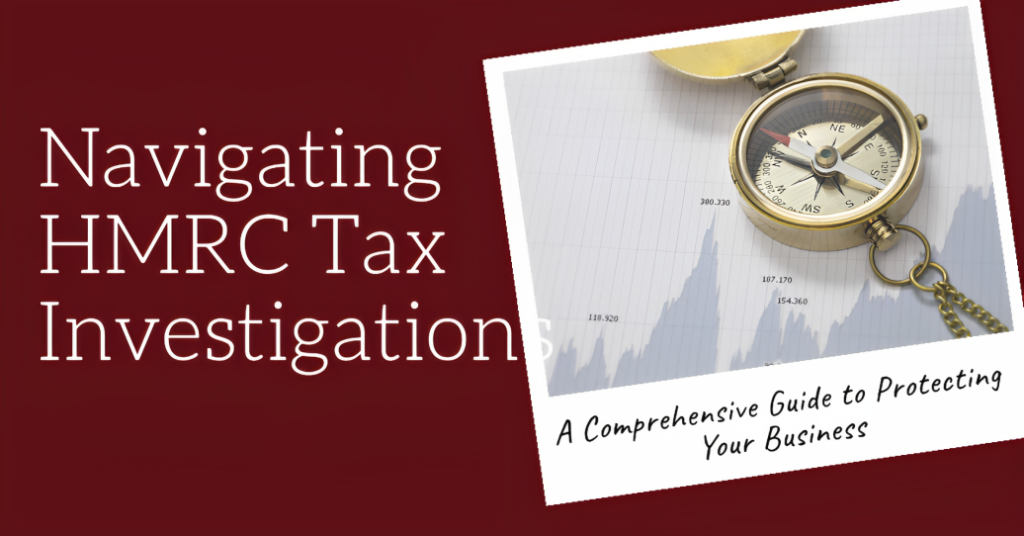HMRC tax investigations can be a source of anxiety and stress for individuals and businesses alike. The UK’s tax authority, HM Revenue and Customs (HMRC) conducts these investigations to ensure compliance with tax laws and regulations.
This comprehensive guide will provide an overview of this kind of tax investigation and a step-by-step guide to help you navigate the process.
Purpose of HMRC Tax Investigations

HMRC (Her Majesty’s Revenue and Customs) tax investigations are conducted to ensure that individuals and businesses are fulfilling their tax obligations correctly and accurately. The main goal is to identify discrepancies, errors, or instances of deliberate tax evasion.
HMRC is responsible for administering and collecting various taxes in the United Kingdom, including income tax, corporation tax, value-added tax (VAT), and others. Tax investigations are a way for HMRC to ensure compliance with tax laws and regulations.
During a tax investigation, HMRC may scrutinize an individual’s or business’s financial records, including tax returns, accounting books, bank statements, and other relevant documents. They may also conduct interviews and gather information from third parties.
Common reasons for tax investigations:
- Detect errors or omissions
- Combat tax evasion
- Ensure fair tax contributions
- Promote compliance
It’s important to note that tax investigations can be initiated for various reasons, such as random checks, specific risk assessments, tips or reports of suspected non-compliance, or as a part of a wider HMRC initiative to target particular industries or tax schemes.
Types of HMRC Tax Investigations
- Random Tax Investigations: These investigations are carried out randomly, without any specific reason or trigger. HMRC selects a certain number of individuals or businesses each year for scrutiny.
- Aspect Tax Investigations: In aspect tax investigations, HMRC focuses on specific areas or aspects of an individual’s or business’s tax affairs. This type of investigation typically targets specific transactions or tax claims.
- Full Tax Investigations: A full tax investigation involves comprehensively examining all aspects of an individual’s or business’s tax affairs. These investigations are usually initiated when HMRC suspects significant non-compliance or fraud.
Indicators That Could Trigger an HMRC Tax Investigation
Several factors can trigger an HMRC tax investigation. While not exhaustive, here are some common indicators that might draw the attention of HMRC:
- Discrepancies in Tax Returns: Significant differences between income declared in tax returns and other sources of information, such as bank statements or third-party reports, can raise suspicions and trigger an investigation.
- Unusual Transactions: Large cash transactions, offshore transfers, or complex financial arrangements that appear unusual or out of the ordinary may attract HMRC’s attention.
- Anonymous Tips or Whistleblower Reports: HMRC receives tips and reports from anonymous sources or whistleblowers. An investigation may be initiated if the information provided suggests potential tax evasion or fraud.
Steps Involved in an HMRC Tax Investigation
When you become the subject of an HMRC tax investigation, the following steps are typically involved:
- Notification: HMRC will send you a formal notification stating that you are under investigation. This notification will outline the specific areas or periods of your tax affairs that are being scrutinized.
- Gathering Information: HMRC will request relevant documents and information to assess your tax compliance. This may include tax returns, financial statements, bank statements, invoices, receipts, and any other records related to your income and expenses.
- Examination of Records: HMRC will carefully examine the provided records to identify any discrepancies, errors, or potential non-compliance with tax laws. They may compare your records with third-party information to verify the accuracy of your tax returns.
- Interviews and Questioning: HMRC may conduct interviews or question you to gather additional information and clarify their concerns regarding your tax affairs. It is crucial to provide honest and accurate answers during these interactions.
- Assessing Tax Liabilities: Based on the gathered information and examination of records, HMRC will assess your tax liabilities. If discrepancies or non-compliance are found, they will calculate the additional tax owed and any penalties or interest charges.
- Negotiation and Settlement: You can negotiate with HMRC regarding the tax liabilities and penalties assessed. It is advisable to seek professional advice during this stage to ensure you achieve the best possible outcome.
Tips to Handle an HMRC Tax Investigation
Dealing with an HMRC tax investigation can be challenging, but keeping the following tips in mind can help you navigate the process more effectively:
- Cooperate and Respond Promptly: It is crucial to respond promptly to HMRC’s requests for information and cooperate fully throughout the investigation. Delays or non-compliance can escalate the situation and lead to further scrutiny.
- Seek Professional Advice: Engage the services of qualified professionals, such as accountants or tax advisors, who can guide you through the investigation process. Their expertise and experience will prove invaluable in protecting your interests and achieving a favorable outcome.
- Keep Accurate Records: Maintain comprehensive and accurate records of your financial transactions, income, and expenses. Organize them systematically to facilitate easy access and retrieval when required during the investigation.
- Review Your Tax Compliance Procedures: Take this opportunity to review your tax compliance procedures and ensure they are robust. Implement internal controls and checks to minimize the risk of errors or discrepancies that could trigger an HMRC tax investigation. Regularly review your tax returns before filing them to ensure accuracy and completeness.
- Be Transparent and Honest: Transparency and honesty are crucial when dealing with HMRC. Provide truthful and complete information during interviews and interactions.
Hiring Professional Help for HMRC Tax Investigations
Facing an HMRC tax investigation can be complex and overwhelming. It is highly recommended to seek professional assistance from qualified experts specializing in tax matters. The following professionals can provide valuable guidance and support:
- Accountants: Certified accountants can help you prepare and organize your financial records, ensuring they are accurate and complete. They can also represent you during interactions with HMRC and provide expert advice on tax matters.
- Tax Advisors: Tax advisors provide strategic tax planning advice and guidance. They can help you understand your tax obligations, identify potential risks, and implement effective tax strategies to minimize liabilities.
- Tax Lawyers: Consulting a tax lawyer is advisable in more complex cases or situations involving legal implications. They can provide legal representation, assist with negotiations, and protect your rights throughout the investigation.
Conclusion
HMRC tax investigations are important to ensuring compliance with tax laws and maintaining the tax system’s integrity. The procedure carefully reviews taxpayers’ financial data to spot errors or non-compliance. Even though tax investigations can be intimidating and stressful for both individuals and companies, it is imperative to approach them with openness, cooperation, and expert advice.
An overview of the HMRC tax investigation procedure, from the initial inquiry to the resolution, has been given in this step-by-step manual. It emphasized keeping current and correct documents, getting expert assistance, and cooperating with HMRC throughout the investigation. Individuals and organizations can navigate tax inquiries skillfully and minimize the potential effects by understanding the procedure and taking the necessary steps.









